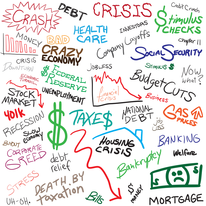
Next week I’ll have three paychecks coming to me - two on Wednesday and one on Friday.
Until then, though, it’s pinching pennies and eating the canned food on the top shelf.
When it comes to my finances, I’m pretty normal.
In fact, most Americans are just like me.
We have no savings, no retirement, and very little in our pockets. Sure, we work...but mostly we’re living paycheck to paycheck.
And I know I’m like most Americans because a book I’m reading right now lays out the stats to prove this.
It’s called The Financial Diaries: How American Families Cope in a World of Uncertainty.
It came out in 2017, is about 175 pages, and was written by New York University professor of public policy and economics, Jonathan Morduch, and senior vice president at the Center for Financial Services Innovation, Rachel Schneider.
I encourage you to get a copy at your local library like I did.
As with most books, what makes this one so memorable are the stories.
We see common people working hard but still struggling to get by in America today.
For instance, a Pew Research poll of 7,000 people in 2014 showed that 92% of people would rather have stability over mobility...something that flies in the face of America’s typical “rags to riches mobility,” which enables people to move “up the income ladder.” (p 6)
So the authors had several families keep financial diaries for a year. A big reason for this was to study the PSID, or Panel Study of Income Dynamics. This measures things like “jobs lost and marriages unraveled, illnesses and disabilities...the kinds of catastrophic losses that transform lives.”
We have too many income swings in our population as well. A 2015 Pew poll showed that nearly half of respondents had gains or losses of income of 25% or more throughout the year.
One person the book profiles is Janice, an older woman that’s worked dealing cards in a Mississippi casino for 20 years. During the year she made $26,000 at her job, or about $1,000 a biweekly paycheck.
But that’s not quite accurate. When you graph Janice’s income you find that her highest paycheck was $1,200 and her lowest $900.
Most of that discrepancy comes from what Janice makes (or doesn’t make) in tips. A big part of that is dependent on the season, the local football schedule, and things like back-to-school time.
All cause people to spend less, and that means Janice makes less. That means she has to make tough choices, like skimping on medicine or going without food. And this is a woman that does everything right, including going to church every Sunday.
But she can’t get ahead, has never been able to get ahead.
And that is the story for countless Americans today.
It’s not just regular working folk like Janice and the others profiled in the book that are having problems.
Recently JPMorgan Chase studied 100,000 random accounts and 135 million transactions. They found that 55% of account holders had monthly income changes of 30% or more.
“There was no meaningful difference in the prevalence, amount, or range of income volatility among households with annual incomes between $23,000 and $100,000.” (p 32)
Clearly, big swings in monthly income are affecting the majority of Americans.
A big reason are the hours we work, with Americans often getting fewer than 40 hours a week...even with 3-4 jobs.
Another big reason is the “Great Risk Shift” that took place in the 1970s when “governments and businesses gradually shifted financial risks from their ledgers onto the shoulders of individuals and families.”
This in turn has led to today’s “Great Job Shift,” which is “a story mostly about how technology has shifted power, in this case from workers to employers.”
In 1960 around 25% of Americans worked in manufacturing, now it’s less than 10%. “Jobs in production, crafts, and repair, as well as clerical, administrative, and some sales jobs, are shrinking. In contrast, jobs in the service sector - food service, home health assistance, personal care, and private police jobs, as well as professional, technical, and managerial jobs - are growing.” (p 36)
Predictably, union membership has fallen as well. Back in 1983, 20% of American workers were in a union but in 2014 it was 11%...in the public sector. In the private sector, unions represent just 7% of American workers.
So as you can see, we’ve got serious problems with the nation’s workforce and their earnings.
Why?
There are so many problems in America today that it’s hard to list them all.
But what are the really big problems, the ones that often create all the others?
And let’s not get too complex, either - many of these were revealed to us millenia ago. We call them sins.
A big one is greed.
Greed is one of America’s biggest problems right now, one that’s contributing to the suffering and heartache of millions of families.
- Employers don’t want to pay workers what their worth. Employees feel powerless to stand up to this.
- Bankers don’t want to help people as much as they want to help themselves. People can do little in the face of this.
- Politicians don’t care about helping the people that elected them, just the people that gave them tons of money to run. Voters can only grit their teeth and fume and say ‘next time,’...though next time never comes.
Despite that, I feel extremely confident.
We know there’ll come a time when the first shall be last and the last shall be first.
It’s coming.
Hell, we're already in World War III and have been for nearly 16 years now.
It started when the two mountains of brass came down. Remember, WWII started in China in 1931...not Europe in 1939 or Hawaii in 1941 like we often think.
I think it’s coming a lot sooner than you think.
Consider the eclipse this month. It hits on August 21 for a couple hours in the afternoon, with a peak around 11:30 AM.
You’ve been hearing a lot about that, and rightly so...it’s rare and fun and exciting.
But how about the major astrological event that’s coming up on September 23?
Oh, and if you were to actually dig into the true calendar of God that was abandoned around 350 BC you’d find that the date should actually be September 21.
Some call this the “Day of Trumpets.”
Many believe that’s when we’ll see the beginning of Revelations via a great sign in the sky, one that causes a war in Israel on the “Day of Trumpets.” That war will last 10 days, ending with Yom Kippur and the revelation of who the Almighty is as well as where the Ark of the Covenant is.
Personally, I’d like to see this.
I’d like to see fire and brimstone and the sinners of the world burning alive.
- Most of them would be rich bankers, the 1% of the 1%.
- Many of them would be our politicians in Washington, the people that claim to care about us.
- Many of them would be the evil people that walk among us, lording it over us and making our lives a living hell.
For many, hell on earth is already here. The book I mentioned earlier profiles many of them, their struggles, and their constant anxiety and worry.
For a select few, earth feels like heaven. People like EPA-head Scott Pruitt, a man that clothes himself in the vestiges of religion on Sunday while doing everything he can to spoil God’s Creation the rest of the week.
Trump is one that’ll burn alive should things come to pass. He’s a skilled and talented charlatan, one that’s great at saying whatever needs to be said to ensure his rise continues while your life gets worse and worse.
For some reason people haven’t applied the age-old tale of the emperor wearing no clothes to Trump. He’s severely insecure, and his self-esteem is lower than that of a pimply-faced teenager who’s voice cracks every time he’s expected to talk.
Why on earth people are afraid of this man is beyond me. Eventually the day will come when he walks into a room and everyone points and laughs.
Yes, the emperor has no clothes and he’ll flee in red-faced embarrassment.
A big problem is that so few people in this country are confident enough to speak truth to power.
We do it on this site all the time.
Thanks for reading.

